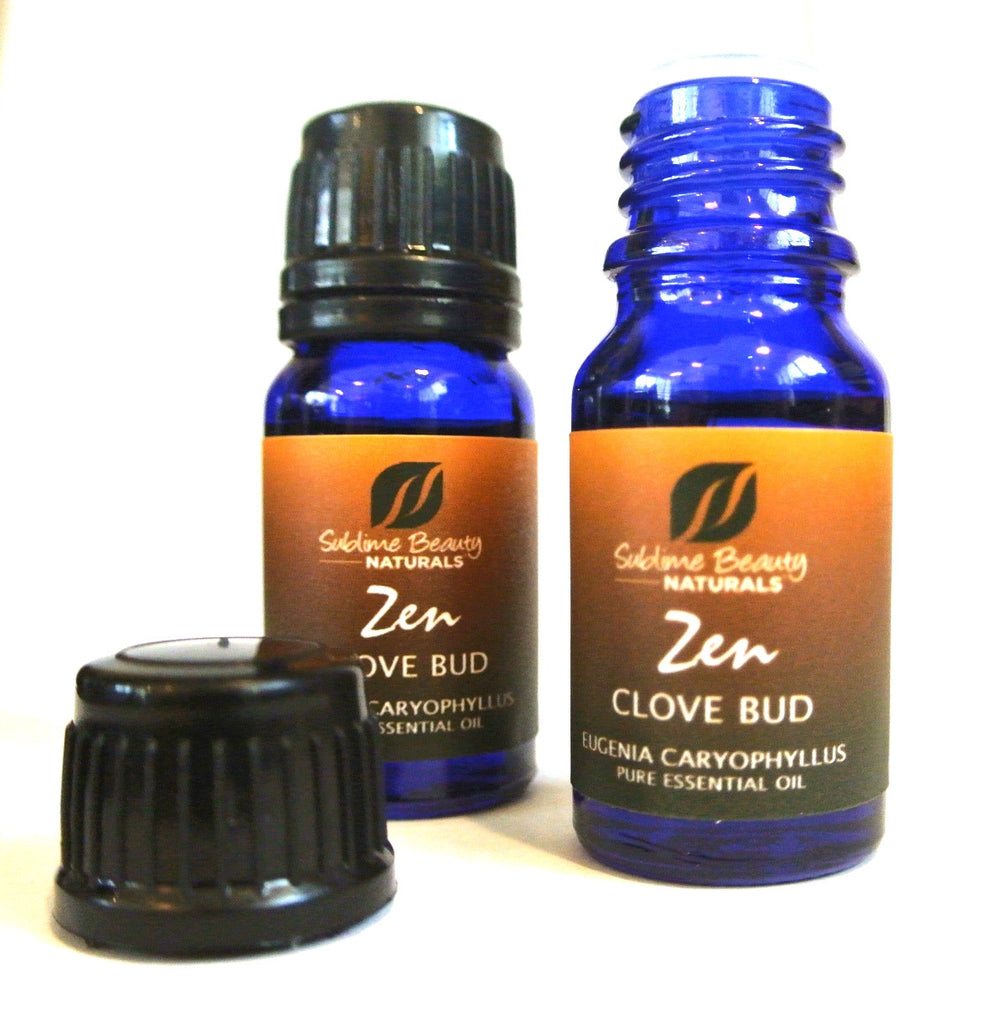ZEN CLOVE BUD ESSENTIAL OIL
Latin name: Eugenia caryophyllata
Sourced: Indonesia
Production: Steam Distilled; the flowers which are a closed bud.

100% Pure Therapeutic Quality. (GC/MS report available upon request.)
LISTEN TO OUR AUDIO ABOUT CLOVE HERE:
Clove is a powerful essential oil, often quite medicinal in applications, and very high in eugenol content (up to 96%). Eugenol is found in cinnamon, clove, nutmeg and basil. Eugenol is a strong bactericide and antiseptic that also helps bring down inflammation. (Clove is found in many dental solutions against bacteria and inflammation.)
Clove gets its name from the French word "clou" which means nail, as the clove buds look like nails.
Cautions: Clove help blood clotting so if you are on a blood thinner against clotting, it is best to avoid. May be harsh for children under 2. This is one that is typically never used neat (undiluted on skin) except for some dental applications. Never ingest – it could be damaging to the liver.
About Clove Bud:
- A Strong Anti-Bacterial and Anti-fungal: Clove is a strong bactericide! It is one of three essential oils in which no bacteria, virus or fungi can live in its presence. Clove has a wide spectrum of antimicrobial activities that is well tested. When combined with Lavender, it has additive effects against bacteria. Clinical test proved that Clove Bud essential oil has excellent activity against HSV I and HSV II (herpes).
- An Excellent Anti-inflammatory and Analgesic: Because it is dominated by eugenol, Clove has excellent anti-inflammatory action and pain relief abilities.
- Top Immune System Support: Clove Bud essential oil can help stimulate the immune system, and support its function.
- Fungi and Yeast: Some studies show that eugenol fights bacteria and inhibits the growth of many fungi, including Candida albicans, the pathogen responsible for most human yeast infections.
- Oral Help: In one study published in The Journal of Dentistry in 2006 (there have been many other studies), a team of dentists recruited 73 adult volunteers and randomly split them into groups that had one of four substances applied to the gums just a canine tooth: a clove gel, benzocaine, a placebo resembling the clove gel, or a placebo resembling benzocaine. Then, after five minutes, they compared what happened when the subjects received two needle sticks in those areas. Not surprisingly, the placebos failed to numb the tissue against the pain, but the clove and benzocaine applications numbed the tissue equally well. “No significant difference was observed between clove and benzocaine regarding pain scores,” the scientists concluded.
- Is warming. Clove offers warming effects and is strengthening for the body and spirit overall.
HISTORICAL ANECDOTES:
- The Chinese have used Clove for more than 2,000 years for many medicinal purposes.
- Clove was treasured in ancient Rome.
- When the Dutch destroyed the Clove trees rampant on the Island of Ternate (in the Moluccas archipelago), the colony was decimated by several epidemics diseases never before seen. It was believed that the power of the clove leaves and flowers were able to purify the air to prevent the diseases (and they were probably right.)
- Clove was one of the essential oils used by the four thieves of Marseilles, who immersed themselves in essential oils before robbing Plague (Black Death) victims – they never got ill.
HOW TO USE:
1) You can inhale or diffuse clove. This is a good one to use if you have sick ones in the house and need to be more aggressive with airborne bacteria. It’s also a good one if you are feeling weak and down – the strong punch will bring you right up.
2) Tooth ache or oral problem? Dip a Q-tip into a little Clove, and touch it on the affected area. This will help relieve inflammation, be an antiseptic against bacteria and relieve pain.
3) If feeling cold and down, Clove’s warmth and brightening qualities are excellent. Diffuse or inhale; or blend into a carrier for a massage oil.
4) Tight muscles, bad pain in legs or shoulders? Clove helps relieve muscular tension and warms plus boosts circulation. Blend a few drops with either Bergamot, Lavender or Rose Geranium in a carrier oil or cream and massage into the affected area.
5) Acne. Various studies have shown Clove is a good acne anti-bacterial. Put 3 drops Clove in 2 tablespoons of raw honey. Blend and apply. You might try a drop of Clove in jojoba oil, and dot on.
6) Toothpaste for Oral Health: Put 1 drop of Clove on your toothpaste (remember you don’t swallow toothpaste!). Here is a natural recipe for toothpaste if you want to experiment: Put 6 tablespoons of organic coconut oil (or sesame oil) to 6 tablespoons of baking soda, mix in a container that seals or closes well; then add 10-15 drops of Clove essential oil (or if you prefer, use Peppermint instead).
REMEMBER TO REFER TO THE SAFETY TIPS BEFORE PURCHASE OR USE.
